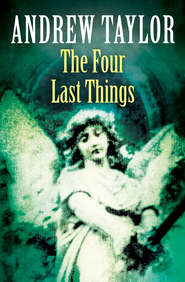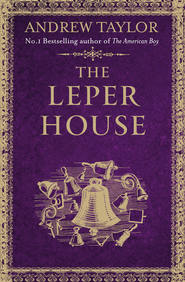По всем вопросам обращайтесь на: info@litportal.ru
(©) 2003-2024.
✖
Richard and Judy Bookclub - 3 Bestsellers in 1: The American Boy, The Savage Garden, The Righteous Men
Автор
Год написания книги
2018
Настройки чтения
Размер шрифта
Высота строк
Поля
“I know,” she murmured, peeping at me through her gloved fingers. “I know. But men are not always rational creatures, are they?”
Chapter 22 (#ulink_32adf30e-f50c-59fc-a64a-933478a2f34b)
On Tuesday the 23rd November, Wavenhoe’s Bank closed its doors for ever. On the same day, two of its customers committed suicide rather than face ruin.
When a bank fails, the consequences spread like a contagion through society: fathers rot in the Marshalsea or blow out their brains, mothers take in sewing or walk the pavements, children are withdrawn from school and beg for pennies, servants lose their places and tradesmen’s bills go unpaid; and so the plague spreads, ever outwards, to people who never heard of Wavenhoe’s or Russell-square.
“Frant burned his fingers badly when the tobacco market collapsed,” Dansey told me as we smoked our evening pipes in the garden. “I have it on good authority that he had to turn to the Israelites to keep his head above water. Oh, and the servants have left. Always a sure sign of a sinking ship.”
On Wednesday there were more suicides and we heard that the bailiffs had gone into that opulent house in Russell-square. Dansey and I stood at a window and watched Charlie Frant, arm in arm with Edgar Allan, marching round the playground and blowing plumes of warm breath into the freezing air.
“I pity the boy, of course. But take my advice: have nothing more to do with the Frants, if you can help it. They will only bring you grief.”
It was sound advice but I was not able to take it, for the very next day, Thursday, the sad history of the Frants and Wavenhoes reached what many believed to be its catastrophe. The first intelligence we had of the terrible events of the night came at breakfast time. The man who brought the milk communicated it to the maids, and the news set the servants whispering and swaying like a cornfield in a breeze.
“Something’s afoot,” Dansey said as we sat with our weak, bitter coffee. “One doesn’t often see them so lively at this hour of the morning.”
Afterwards, Morley sidled up to us, with Quird hovering as usual at his elbow. “Please, sir,” he said to Dansey, shifting from one foot to the other, his face glowing with excitement. “Something horrible has happened.”
“Then I advise you not to tell me what it is,” Dansey said. “It may distress you further.”
“No, sir,” Quird broke in. “Truly, sir, you don’t understand.”
Dansey scowled at the boy.
“I beg your pardon,” Quird said quickly. “I did not mean to –”
“Someone’s been murdered in the night,” Morley broke in, his voice rising in his excitement.
“They say his head was smashed into jelly,” Quird whispered. “Torn limb from limb.”
“It might have been any of us,” Morley said. “The thief could have broken in and –”
“So a thief has turned to murder?” Dansey said. “Perhaps Stoke Newington is not such a humdrum place after all. Where is this interesting event said to have occurred?”
“Not exactly in the village, sir,” Morley answered. “Somewhere towards town. Not a stone’s throw from us, not really.”
“Ah. I might have known. So Stoke Newington remains as humdrum as ever. When there is news I shall be interested to hear it. In the meantime, I do not propose to waste my few remaining moments of leisure listening to second-hand servants’ gossip. Good morning.”
Morley and Quird retreated. We watched them leaving the room.
“What tiresomely underbred creatures they are, to be sure,” Dansey said.
“I wonder if there is some truth in what they heard.”
Dansey shrugged. “Very possibly. No doubt we shall be talking about it for weeks on end. I can imagine nothing more tedious.”
This was not affectation on his part. Dansey could be reticent to a fault but he rarely troubled to lie. Indeed, he rarely troubled much with anything; I sometimes wonder what might have become of him if he had.
I did not have to wait long to learn more. Part way through morning school Mr Bransby’s servant came to fetch me. I found my employer in the parlour with a small man in grey, mud-stained clothes. Bransby was pacing up and down, his face redder than usual.
“Allow me to present Mr Shield, one of my ushers,” he said, pausing to help himself to a large pinch of snuff. “Mr Shield, this is Mr Grout, the attorney who acts as clerk to the magistrates. I regret to say that a most shocking circumstance has come to light, one that may cast a shadow over the school.”
Mr Grout had a face that was an appendage of his nose, like a mole’s. “A man has been murdered, Mr Shield. His body was found early this morning by a watchman at a building plot not more than a mile and a half away. There is a possibility that you may be able to identify the unfortunate victim.”
I stared in consternation from one to the other. “But I have never been there. I did not even know –”
“It is not the location which is our concern,” the clerk interrupted. “It is the identity of the victim. We have reason to believe – I would put it no more strongly than that – that he may not be unknown to you.”
Bransby sneezed. “Not to put too fine a point on it, Shield, Wavenhoe’s Bank had an interest in this building projection.”
“The bank hold the head-lease on the land themselves. Or perhaps I should say held.” Grout wrinkled his nose. “Owing to the scarcity of money at the present time, the man who holds the principal building-lease, a Mr Owens, was compelled to apply to them for a series of loans. Unfortunately the money the bank provided was not enough to meet his obligations. The poor fellow hanged himself in Hertford a few months ago.”
Bransby shook his head. “And now poor Frant has gone to meet his Maker. Truly an unlucky speculation.”
“Mr Frant is dead?” I blurted out.
“That is the question,” Grout said. “The watchman believes the body is Mr Frant’s. But he met him only once, and that briefly, and he cannot be said to be a reliable witness at the best of times. At such short notice I have been able to find no one in the vicinity who knows Mr Frant. But I understand that he has – had, that is to say – a boy at the school, so I have driven over to see whether someone was able to identify the body; or not, of course, as the case may be. Mr Bransby tells me he has never met Mr Frant either, but that you have.”
“Yes, sir, on several occasions. Tell me, what of Mrs Frant? Has she been informed?”
Grout shook his head. “It is a delicate matter. One would not like to tell a lady that her husband had been murdered, only to discover that the victim was in fact somebody else. Mr Bransby tells me you have been a soldier, sir, that you were in fact one of our glorious army at Waterloo. I hope I am correct in inferring that the sight of a man who has died a violent death may have fewer terrors for you than it would for a mere civilian.”
There was a glazed expression on Mr Bransby’s face. He gave me a tight smile and nodded. I knew I had little choice but to accept the rôle that he had allotted me.
Mr Grout bowed to my employer. “Mr Shield should be back in time for dinner.”
“Well, the sooner this is done the better.” Bransby fixed me with a glare. “We can only hope and pray that the unfortunate man does not prove to be Mr Frant.”
A few minutes later, Mr Grout and I were driving briskly away in his whiskey. We rattled down Church-street and turned right into the High-street. It was on this road, not very far south from here, that I had met Mr Frant for the first time – in September, when I had walked to Stoke Newington to take up my situation at Mr Bransby’s school. I remembered the meeting well enough – as one does when a man more or less threatens to set his servants on one – but he had never shown the slightest recollection of it. It occurred to me that now I had a possible explanation for his presence on the road that day, one that perhaps also accounted for Mr Frant’s bad temper: he had been inspecting one of his failing investments.
We turned into a narrow lane between tall hedges. As we bounced and slithered along on a surface of rutted, frozen mud, I glimpsed market gardens and scrubby pasture over the tops of the hedges. Grout squeezed the whiskey into an opening on the left that led to a large field. There was little grass to be seen – merely heaps of sand and gravel, stacks of bricks, and above all mud. Few walls were higher than my waist. The plot looked as if it had recently suffered an artillery bombardment, leaving two rows of ruins separated by an immense heap of spoil. Grout pulled up beside a wooden shed. For a moment we looked out over the dismal scene.
“I believe the design is for twenty houses facing each other across a communal garden,” Grout said. “Wellington-terrace. Mr Owens drew up the plans himself. According to the prospectus, Londoners will flock to benefit from the healthy air.”
“One can see why he felt obliged to hang himself,” I observed.
“I agree – it is not a happy place. Nothing has gone well for the scheme from start to finish.”
The door of the shed opened and a man came out, touching his hat.
“Ah, there is the constable.” Grout raised his voice. “Well, where is he?”
“We brought him in here, sir, just as you said.”
Grout glanced at me. “Are you ready, Mr Shield? Then let us wait no longer.”
We jumped down from the whiskey and followed the constable over the caked mud into the shed. My eyes adjusted slowly to the gloom. A small stove burned in the corner and filled the air with heavy, acrid fumes. A man huddled beside it, a clay pipe smouldering in his mouth. In the shadows at the back of the shed was the shape of a door laid upon trestles. On the door lay the long, dark mound of a body. I sniffed: in the smoke were other smells: the tang of spirits and the dark effluvium of the charnel house.











